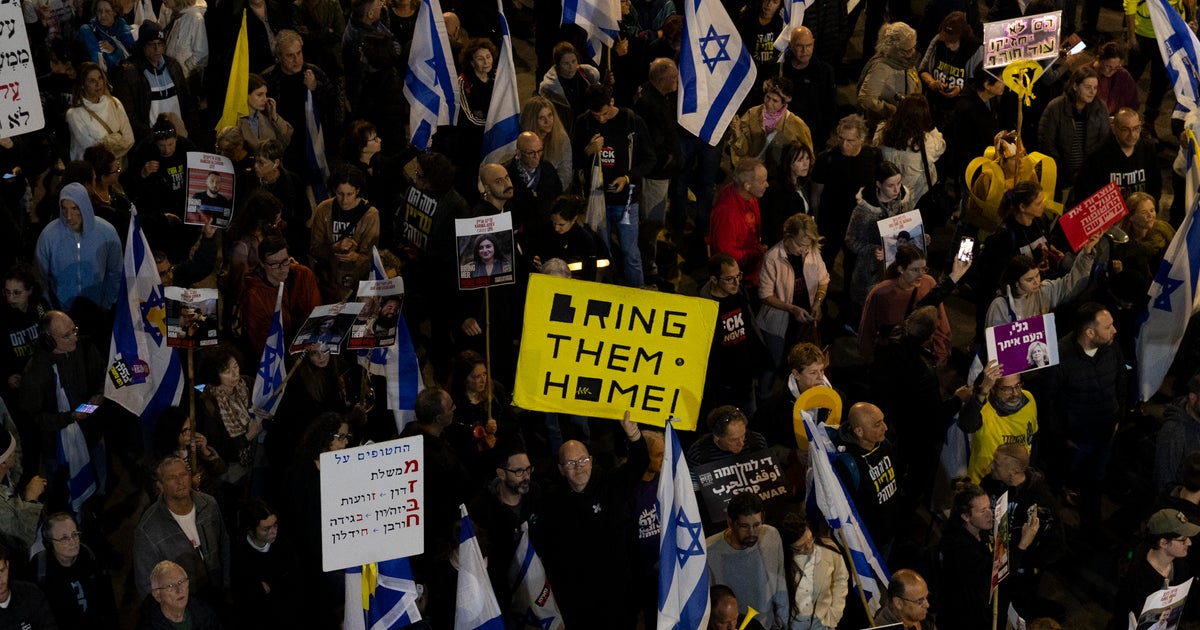CBS News
Blinken in Israel for talks as U.N. prepares to vote on U.S.-sponsored cease-fire resolution

Secretary of State Antony Blinken arrived in Tel Aviv on Friday on the final stop in his sixth urgent trip to the region since the start of the Israel-Hamas war. He said he would share alternatives to Israel’s planned ground assault into the southern Gaza town of Rafah during talks with Israeli Prime Minister Benjamin Netanyahu and the country’s war cabinet.
“A major ground operation there would mean more civilian deaths, it would worsen the humanitarian crisis,” Blinken told journalists in Cairo on Thursday. “There is a better way to deal with the threat, the ongoing threat posed by Hamas.”
The United Nations Security Council was scheduled to vote Friday on a U.S.-sponsored resolution declaring “the imperative of an immediate and sustained cease-fire” in the war. In a statement overnight, European Union leaders called “for an immediate humanitarian pause leading to a sustainable ceasefire, the unconditional release of all hostages and the provision of humanitarian assistance.”
So little food has been allowed into Gaza that up to 60% of children under 5 are now malnourished, compared with fewer than 1% before the war began, World Health Organization Director-General Tedros Adhanom Ghebreyesus said Thursday.
The Hamas-controlled Health Ministry in Gaza raised the territory’s death toll Thursday to nearly 32,000 Palestinians. The ministry doesn’t distinguish between civilians and combatants in its counts but says women and children make up two-thirds of the dead.
Palestinian militants killed some 1,200 people in the surprise Oct. 7 attack out of Gaza that triggered the war, and abducted another 250 people. Hamas is still believed to be holding some 100 people hostage, as well as the remains of 30 others.
CBS News
Here’s how much more it will cost to heat your home this winter

Americans are expected to spend more money heating their homes this winter than on holiday gifts, according to new research.
The elevated cost of staying warm indoors amid cold outdoor temperatures comes after an unusually hot summer, that led to households spending bigger shares of their budgets on cooling costs, compared with previous years, according to a report from the National Energy Assistance Directors Association (NEADA).
On average, spending on home heating this winter is projected to increase by 8.7% to $941, up from $866 last winter. The increased costs are attributed in part to both expected colder temperatures in the Northeast and Midwest states.
The new average expenditure on heating costs outpaces the $902 the average household is expected to spend on Christmas presents this year, according to a forecast from the National Retail Federation.
What’s driving up home heating costs?
There are different ways to keep residences warm. Families that use electricity to heat their homes are expected to face the largest increase in costs — more than 14% — which will bring the total up to $1,189 from $1,040 from mid-November through mid-March, which NEADA considers to be the winter period.
Driving up prices is the rising cost of updating and maintaining the electric grid. Plus, colder weather is expected to lead to increased consumption.
“It’s colder, and the cost of electricity is up as the grid is rebuilt. So we’re seeing both higher prices and greater usage,” NEADA Executive Director Mark Wolfe told CBS MoneyWatch.
Natural gas, propane and heating oil cost differences
Natural gas and propane users are also expected to be hit with bigger bills this winter. Heating costs for natural gas are up just over 3%, for an average cost of $634 for the winter period, compared with $615 for 2023-2024. Costs are expected to rise only modestly in line with wholesale prices.
Propane costs are up 4.4%, with families expected to spend an average of $1,231 heating homes, up from $1,179 last season.
Heating oil costs, by contrast, have declined 2.7%, which means average spending this winter will be $1,518, down from $1,560 last winter.
Early start to the season
November was colder than usual, with temperatures dropping prematurely after a “very expensive summer” of heat waves straining cooling resources, said Wolfe.
Blame climate change for the big swings in temperature, he added.
“Weather conditions can be very unpredictable even though over time, winters are getting warmer and summers are getting hotter. It’s not a straight line, and for consumers, it’s quite upsetting because higher utility bills are coming right before Christmas,” Wolfe said.
Steps to take now
There are steps consumers can take to help keep a lid on home heating costs.
Wolfe urges people to have their thermostats serviced now, before the coldest temperatures of the season roll in. That way, families won’t be on the hook for an emergency repair if their thermostat breaks in the middle of a cold front. A tune-up will also help heating systems run more efficiently, he said.
Always close the furnace flue, or else it will lead heat outside the house, advises Wolfe. Lastly, manually turn down the heat at night, if you can, to save up to 10% on your energy bill.
CBS News
The Pager Plot | Sunday on 60 Minutes

Watch CBS News
Be the first to know
Get browser notifications for breaking news, live events, and exclusive reporting.
CBS News
Mega Millions jackpot soars to $862 million for Friday night’s drawing

There’s still time to become a mega-millionaire for Christmas, but lady luck will have to be on your side.
No one matched Mega Millions‘ all six winning numbers last Tuesday, and the jackpot now stands at $862 million ahead of Friday night’s drawing.
The jackpot has been rolling since it was last won at $810 million in Texas on Sept. 10.
If there is a sole winner, they have a choice between an annuity, with an initial payment and then 29 annual payments, or a one-time lump sum payment. Most winners choose a cash payout.
For Friday night’s drawing, that would be an estimated $392.1 million before taxes.
If won at that level, it would be the largest prize ever won in December and the seventh largest in Mega Millions history.
According to Mega Millions, 13 jackpots have been won during December since the game began in 2002. Three were won in the days after Christmas, while the other 10 were won before Christmas. There has never been a jackpot win on Christmas Day, although over the years drawings have been conducted on Christmas six times – in 2007, 2009, 2012, 2015, 2018 and 2020.
Mega Millions drawings are held on Tuesday and Friday, tickets cost $2. The odds of winning the jackpot are about 1 in 303 million.








